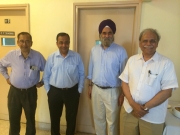Digitization of India will not only increase the efficiency of the government and public sector but also bring about huge democratization of the economy´’ believes Prof. Nirvikar Singh, University of California, Santa Cruz. In his ‘’brainstorming’’ session with the research fellows and the director general of NCAER Dr Shekhar Shah, Prof. Singh reviewed a presentation on the Government’s Digital India programme, prepared by the Department of Electronics and Information Technology.
With technology taking over almost all of manual labour, and the evident lack of skilled labour in India, it is imperative to have the country’s labour force skilled in Information Technology. With this in mind, India’s Digital India Campaign aims to make technology central to enable change. The vision of this programme encompasses three areas: universal access to digital infrastructure, government services, and citizen empowerment. This vision is further developed to include electronics manufacturing and job creation as well.
Prof. Singh began with a basic overview of what Digital India entails, and led a discussion of the conceptual structure of the programme, its potential challenges, and possibilities for prioritization and successful implementation. He explained why India’s foremost challenge is to provide broad base digital access and to build on it to improve government and market efficiency.
The discussion ended with a very insightful as well as thought provoking Q&A session, largely centred on ways to raise digital literacy, increase digital inclusion, and improve digital connectivity. Major issues discussed were the extent of state subsidy for connectivity as a public good, the role of startups and private sector in the deployment of a digital infrastructure in rural and urban India, the increasing female labour force participation and global competitiveness of the semi-skilled and skilled Indian workforce.
Prof. Singh’s paper titled ‘Information Technology and its Role in India’s Economic Development’ will be published by Springer in a forthcoming conference volume. You can also find it here, attached with this post.
Nirvikar Singh is Professor of Economics and Sarbjit Singh Aurora Chair of Sikh and Punjabi Studies at the University of California, Santa Cruz, where he also directs the Center for Analytical Finance. He has been a member of the Advisory Group to the Finance Minister of India on G-20 matters, and has served as Consultant to the Chief Economic Adviser, Ministry of Finance, Government of India. Professor Singh’s current research topics include entrepreneurship, information technology and development, electronic commerce, business strategy, political economy, federalism, economic growth and the Indian economy. He has authored over 100 research papers and co-authored or edited several books. He has also served as an advisor for several start-ups and knowledge services firms in Silicon Valley and in India. He received his PhD from the University of California, Berkeley.






